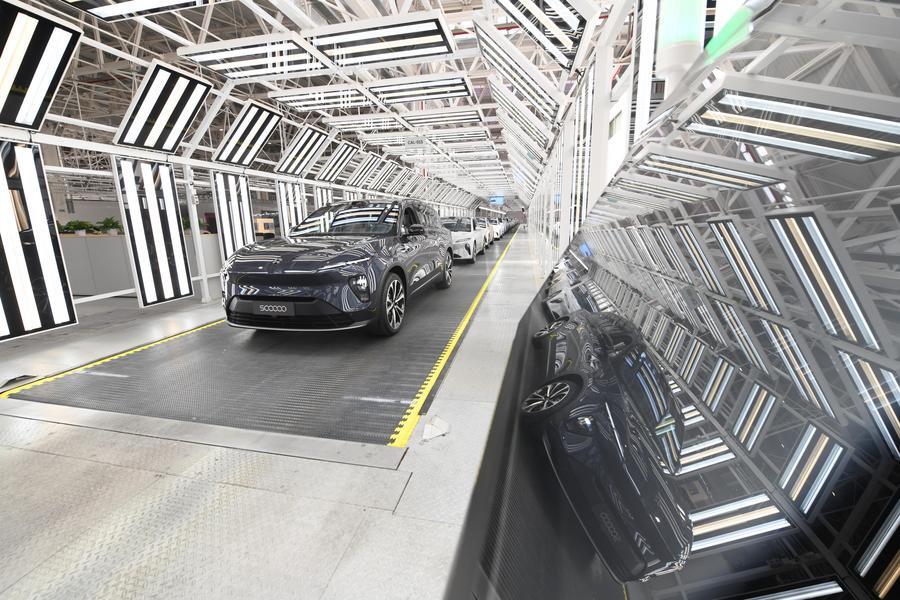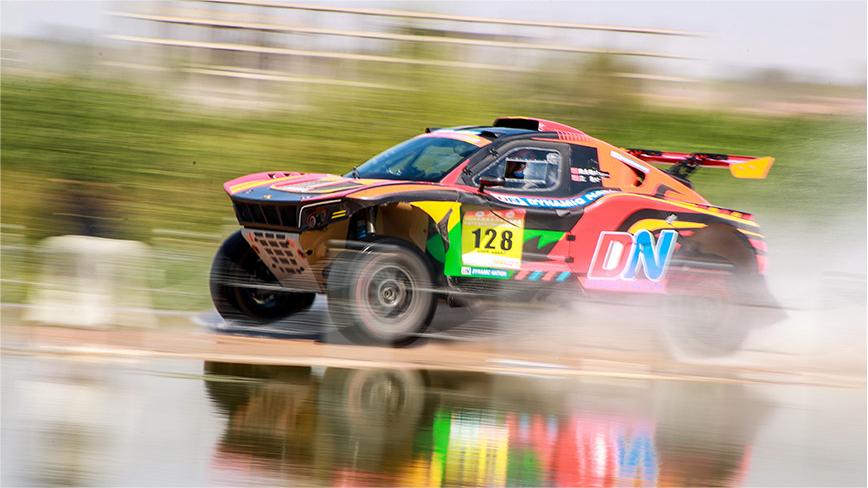EU's "new trio" subsidy policies implemented in name of green transition
On Aug. 20, 2024, the European Commission disclosed a draft decision to impose definitive countervailing duties on imports of electric vehicles (EVs) from China, ranging from 17 percent to 36.3 percent.
This has been closely followed by the international community, with many European Union (EU) member states, auto industry organizations and enterprises, think tanks and scholars expressing their opinions. Many have pointed out that this anti-subsidy measure is using the guise of "fair trade" to enact protectionism, and the promotion of the EU's EV industry should not be afraid of competition.

This photo taken on May 9, 2024 shows NIO's 500,000th vehicle at the NIO Second Advanced Manufacturing Base in Hefei, east China's Anhui Province. (Xinhua/Zhang Duan)
In reality, the EU's intention is to gain an upper hand in the new round of global competition to achieve dominance in industries related to the green transition and tackling climate change. In recent years, many countries have prioritized the "new trio" industries, which are photovoltaic products, EVs, and lithium batteries, high on their industrial development agenda, with the countries of the EU being no exception.
Following the release of the European Green Deal by the commission in 2019, the EU has especially begun to focus on the green transition of the energy sector, and pushing for the progress of new energy industries, including the "new trio". In 2020, the commission issued an industrial strategy, which clearly stated that it would provide investment and financing support for industries' green transitions.
In fact, the EU's efforts to accelerate the development of the "new trio" and other new energy industries are not only aimed at achieving the United Nations Sustainable Development Goals (SDGs), but also to leverage these sectors to enhance the EU's global industrial competitiveness and secure a leading position in the world, all while implementing substantial industrial subsidies.
The EU is one of the earliest regions in the world to implement energy industrial policies, and the European economic integration is a result of industrial policy coordination among member states.
In recent years, the EU has scaled up financial support for green industries, like the "new trio", and relevant sectors conducive for green development. It has put an emphasis on green energy transition and net-zero technology R&D, making the enhancement of global industrial competitiveness a primary objective.
In the EU's first overall energy strategy rolled out in 2006, it already stressed the importance of fueling new energy industries. EU's industrial policies related to the "new trio" have become its core measure to get a stronger competitive edge and secure a leading position in the world. Additionally, it has carried out full-fledged subsidies, with supportive funds of at least 11 categories and other means in place.
As the EU has vigorously developed and subsidized its own "new trio" industries, it adopts discriminatory restraint measures towards other countries' "new trio" products, making its true motive worth mulling over.
As for the EU's anti-subsidy investigation into Chinese EVs, China questioned the legitimacy of the commission's decision to launch the ex-officio investigation, believing it's driven by political intentions, and is a protectionist action.
In the last several years, the EU has granted billions of euros to subsidize and build up its EV supply chain, and it will keep comprehensively subsidizing the local EV industry in the future.
In response to the commission's disclosure on planned tariffs on EVs imported from China, a spokesperson with China's Ministry of Commerce pointed out that, the commission's anti-subsidy investigation process on Chinese EVs did not comply with the rules of the World Trade Organization and was an act of "unfair competition" under the guise of "fair competition."
At present, the EU, under the guidance of relevant documents, such as the European Green Deal, has established a systematic and comprehensive set of policies and coordination strategies for the "new trio" industries, and endeavored to lift its industrial competiveness in these fields through subsidies in different forms.
On the surface, the EU has enforced legal supervision and restricted member states from providing state aid that could distort the market, yet many exceptions are set. Furthermore, on the pretext of facilitating green advancement and transition, it has constantly expanded the scope of these exceptions, leaving sufficient leeway and flexibility for itself and its member states to subsidize their "new trio" industries.
According to data released by the commission, between 2018 and August 2024, the commission, within the framework of the Important Projects of Common European Interest (IPCEI), has approved 36.2 billion euros in state aid, 320 projects in total, across fields ranging from batteries and hydrogen energy to communication technologies and cloud infrastructure and services. In particular, the battery industry has had 68 projects approved, accounting for 21 percent in total, with a subsidy of 6.1 billion euros.
This clearly demonstrates that the EU has spared no efforts to implement supportive policies regarding the "new trio" industries in a bid to be competitive and take a lead in emerging sectors in the international arena.
(The opinions mentioned above are extracted and translated from an article written by Shi Xiaoli and Cui Yunfei, from the China University of Political Science and Law.)
Photos
Related Stories
- EU tariffs trigger trade war concerns
- China files appeal to WTO over EU electric vehicle tariffs
- First plenary session of newly-elected European Parliament held in France
- China launches probe into EU practices in foreign subsidy investigations
- PD Explainer | EU protectionism contradicts European Green Deal
Copyright © 2024 People's Daily Online. All Rights Reserved.









